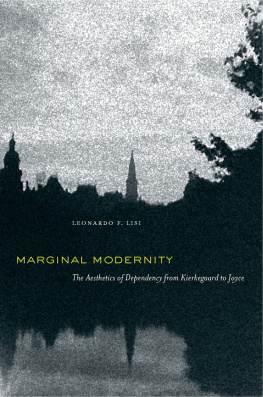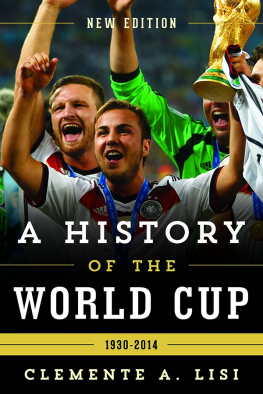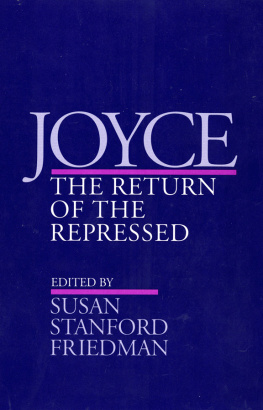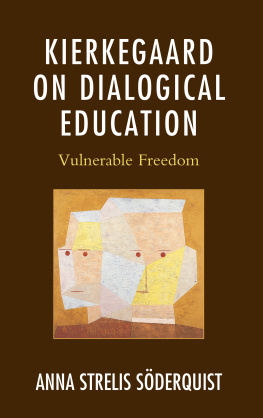Lisi - Marginal modernity: the aesthetics of dependency from Kierkegaard to Joyce
Here you can read online Lisi - Marginal modernity: the aesthetics of dependency from Kierkegaard to Joyce full text of the book (entire story) in english for free. Download pdf and epub, get meaning, cover and reviews about this ebook. City: New York, year: 2013;2012, publisher: University of Virginia Press;Fordham University Press, genre: Romance novel. Description of the work, (preface) as well as reviews are available. Best literature library LitArk.com created for fans of good reading and offers a wide selection of genres:
Romance novel
Science fiction
Adventure
Detective
Science
History
Home and family
Prose
Art
Politics
Computer
Non-fiction
Religion
Business
Children
Humor
Choose a favorite category and find really read worthwhile books. Enjoy immersion in the world of imagination, feel the emotions of the characters or learn something new for yourself, make an fascinating discovery.
- Book:Marginal modernity: the aesthetics of dependency from Kierkegaard to Joyce
- Author:
- Publisher:University of Virginia Press;Fordham University Press
- Genre:
- Year:2013;2012
- City:New York
- Rating:3 / 5
- Favourites:Add to favourites
- Your mark:
- 60
- 1
- 2
- 3
- 4
- 5
Marginal modernity: the aesthetics of dependency from Kierkegaard to Joyce: summary, description and annotation
We offer to read an annotation, description, summary or preface (depends on what the author of the book "Marginal modernity: the aesthetics of dependency from Kierkegaard to Joyce" wrote himself). If you haven't found the necessary information about the book — write in the comments, we will try to find it.
Lisi: author's other books
Who wrote Marginal modernity: the aesthetics of dependency from Kierkegaard to Joyce? Find out the surname, the name of the author of the book and a list of all author's works by series.
Marginal modernity: the aesthetics of dependency from Kierkegaard to Joyce — read online for free the complete book (whole text) full work
Below is the text of the book, divided by pages. System saving the place of the last page read, allows you to conveniently read the book "Marginal modernity: the aesthetics of dependency from Kierkegaard to Joyce" online for free, without having to search again every time where you left off. Put a bookmark, and you can go to the page where you finished reading at any time.
Font size:
Interval:
Bookmark:
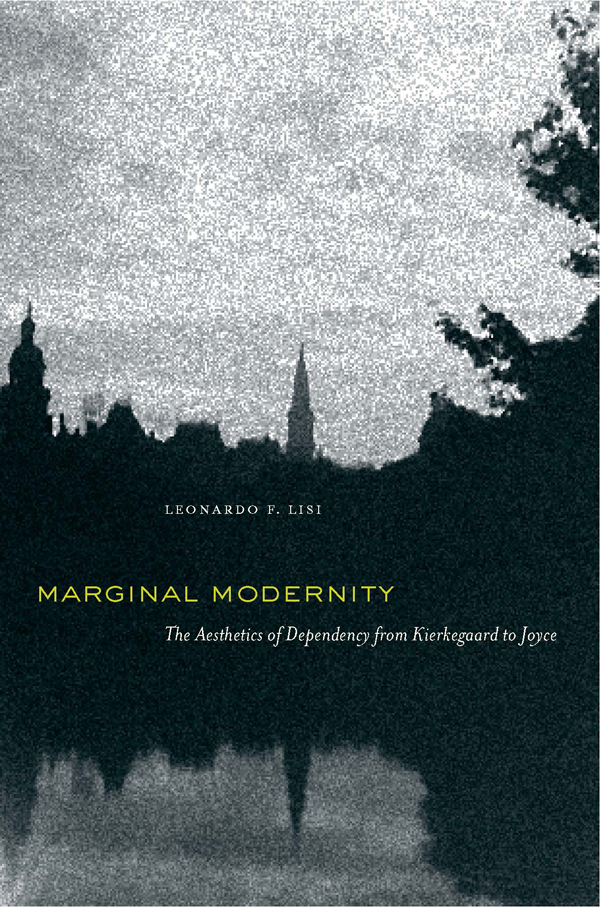
Marginal Modernity
The Aesthetics of Dependency from Kierkegaard to Joyce
Leonardo F. Lisi
Fordham University Press
New York
2013

This book is made possible by a collaborative grant from the Andrew W. Mellon Foundation.
Copyright 2013 Fordham University Press
All rights reserved. No part of this publication may be reproduced, stored in a retrieval system, or transmitted in any form or by any meanselectronic, mechanical, photocopy, recording, or any otherexcept for brief quotations in printed reviews, without the prior permission of the publisher.
Fordham University Press has no responsibility for the persistence or accuracy of URLs for external or third-party Internet websites referred to in this publication and does not guarantee that any content on such websites is, or will remain, accurate or appropriate.
Fordham University Press also publishes its books in a variety of electronic formats. Some content that appears in print may not be available in electronic books.
Library of Congress Cataloging-in-Publication Data
Lisi, Leonardo F.
Marginal modernity : the aesthetics of dependency from Kierkegaard to Joyce / Leonardo F. Lisi. 1st ed.
p. cm.
Includes bibliographical references and index.
ISBN 978-0-8232-4532-1 (cloth : alk. paper)
1. Modernism (Literature) 2. Dependency (Psychology) in literature. 3. Aesthetics in literature. 4. Philosophy in literature. I. Title.
PN56.M54L57 2013
809'.9112dc23
2012027756
First edition
For EmilyLad saa Gud beholde Himlen, naar jeg maa beholde hende.
Contents
It seems inevitable that a book concerned with the concept of dependency should be deeply conscious of the many debts it has incurred. The present project was begun in the Department of Comparative Literature at Yale University, where, from its inception, it received the invaluable support and encouragement of Pericles Lewis and Paul Fry. Many other members of Yales faculty were instrumental in providing feedback at early stages of the manuscript and in challenging me to explore some of these ideas in their initial form, including Karsten Harries, Katie Trumpener, Carol Jacobs, Giuseppe Mazzotta, Benjamin Harshav, and Moira Fradinger. No better beginning to this book could have been wished for, and I am deeply grateful for their continued interest and support.
Early on in the research for this book, I had the great fortune of spending a summer as a visiting researcher at the Sren Kierkegaard Research Center at the University of Copenhagen, then under the direction of Niels Jrgen Cappelrn. The opportunity to use the centers resources, to engage in discussion with the outstanding scholars it has gathered, and to benefit from its directors extraordinary intellectual generosity and dedication proved a utopian experience. Additional research stays at the Ruprecht-Karls-Universitt Heidelberg and at the Howard and Edna Hong Kierkegaard Library at St. Olaf College were likewise critical in developing my work. I am grateful especially to Cynthia Lund for helping to make my stay at St. Olaf as productive as possible.
The book obtained its final form after I had the privilege of joining the Humanities Center at Johns Hopkins University. The vibrant intellectual life of this community is extraordinary, and the support and encouragement that my colleagues at the Humanities Center have offered me during this time have been invaluable. I am particularly indebted to Michael Fried, Gabrielle Spiegel, and Hent de Vries, who, with unlimited generosity, provided repeated guidance and assistance for this project during its concluding stages. Without them, my doubts about the possibility of finishing would certainly have been more frequent than they were, and the final product has benefited immeasurably from their involvement.
More people than I can thank here have had the kindness to share their ideas with me on many of the topics that I develop in the pages ahead. Ruth Leys, Paola Marrati, and members of the Johns Hopkins Mellon Seminar led by Gabrielle Spiegel have patiently listened to my arguments and challenged me to think about them in new ways. Jon Stewart at the University of Copenhagen has repeatedly encouraged me to pursue my work on Kierkegaard and first suggested that I write on Heiberg. Tobias Boes arranged for me to present an early version of the material on Hofmannsthal to the German Department at the University of Notre Dame, where I benefited greatly from the audiences comments. I had the opportunity to share an early version of the chapter on Joyce with the English faculty at Bowdoin College, and their remarks and questions likewise helped me clarify my argument further. Frode Helland from the Ibsen Center at the University of Oslo and Mark Sandberg from the Scandinavian Department at the University of California, Berkeley, offered me extremely kind encouragement and support at a very early stage of this project. Glenn Odom and Gsli Magnusson made me question my reasoning anew at a point when I already thought that it was settled. At Fordham University Press, Helen Tartars outstanding editorial guidance, and the help of Thomas C. Lay and Tim Roberts, among many others, made the process of completing the manuscript and preparing it for publication as effortless and pleasurable as I could possibly have wished. Laura Iwasaki provided scrupulous and excellent copyediting of the manuscript. I am also indebted to the referees for Fordham University Press, whose detailed comments and suggestions were extremely useful in bringing this project to its conclusion.
Finally, my deepest gratitude is to my family. Dispersed across four countries and three continents, their love has been with me at all times. Emily, sola per cui, shared every moment of this book. With infinite patience, she tested every thought that it contains and, in her superior intelligence, forgave the author for his failings.
An earlier version of chapter 1 of this book was published as Kierkegaards Epistemology of Faith: Outline towards a Systematic Interpretation, in Kierkegaard Studies Yearbook 2010, edited by Niels Jrgen Cappelrn, Herman Deuser, and Brian Sderquist (New York and Berlin: Walter de Gruyter, 2010), 353375. Portions of chapter 2 appeared in Heiberg and the Drama of Modernity, in Johan Ludvig Heiberg: Philosopher, Litrateur, Dramaturge, and Political Thinker, edited by Jon Stewart (Copenhagen: Museum Tusculanum Press, 2008), 421448. An earlier version of chapter 3 was published as Allegory, Capital, Modernity: Peer Gynt and Ibsens Modern Breakthrough, Ibsen Studies 8, no. 1 (2008): 4368. Different sections of chapter 4 were first published in Kierkegaard and the Problem of Ibsens Form, Ibsen Studies 7, no. 2 (2007): 203226; and Endelighedens stetik: Modernismens problematik hos Kierkegaard og Ibsen, in Kierkegaard, Ibsen og det Moderne, edited by Niels Jrgen Cappelrn et al. (Oslo: Universitetsforlaget, 2010), 99116. All previously published material has been substantially revised and expanded in the present context.
Whenever possible, primary sources in languages other than English are cited first by page number in an English translation followed by a slash and the original-language edition. The only exceptions to this rule are references to Kants Critique of Pure Reason, which follow the standard convention of giving the page numbers in both the first and the second edition, indicated by A and B respectively, and likewise are separated by a slash. References to foreign-language works in the main body of the text will use the established English-language version of the title or, for cases in which no translation exists, my translation of the original title (although parenthetical citations will be given to the original title if more than one work by an author appears in the bibliography). I have provided my own translations when an English translation does not exist or I have preferred not to follow previously published translations. English translations of secondary sources have been used when accessible, except when the original version differs in relevant ways, in which case, references to both translation and original have been provided.
Font size:
Interval:
Bookmark:
Similar books «Marginal modernity: the aesthetics of dependency from Kierkegaard to Joyce»
Look at similar books to Marginal modernity: the aesthetics of dependency from Kierkegaard to Joyce. We have selected literature similar in name and meaning in the hope of providing readers with more options to find new, interesting, not yet read works.
Discussion, reviews of the book Marginal modernity: the aesthetics of dependency from Kierkegaard to Joyce and just readers' own opinions. Leave your comments, write what you think about the work, its meaning or the main characters. Specify what exactly you liked and what you didn't like, and why you think so.

